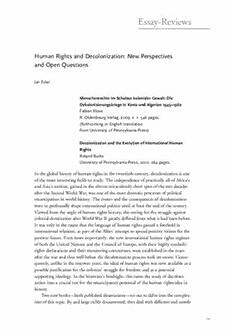Table Of ContentEssay-Reviews
Human Rights and Decolonization: New Perspectives
and Open Questions
JanEckel
MenschenrechteimSchattenkolonialerGewalt:Die
DekolonisierungskriegeinKeniaundAlgerien1945–1962
FabianKlose
R.OldenbourgVerlag,2009.x(cid:5)346pages.
(forthcominginEnglishtranslation
fromUniversityofPennsylvaniaPress)
DecolonizationandtheEvolutionofInternationalHuman
Rights
RolandBurke
UniversityofPennsylvaniaPress,2010.264pages.
Intheglobalhistoryofhumanrightsinthetwentiethcentury,decolonizationisone
ofthemostinterestingfieldstostudy.TheindependenceofpracticallyallofAfrica’s
andAsia’snations,gainedinthealmostmiraculouslyshortspanofthetwodecades
aftertheSecondWorldWar,wasoneofthemostdramaticprocessesofpolitical
emancipationinworldhistory.Theeventsandtheconsequencesofdecolonization
weretoprofoundlyshapeinternationalpoliticsuntilatleasttheendofthecentury.
Viewedfromtheangleofhumanrightshistory,thesettingforthestruggleagainst
colonialdominationafterWorldWarIIgreatlydifferedfromwhatithadbeenbefore.
Itwasonlyinthe1940sthatthelanguageofhumanrightsgainedafootholdin
internationalrelations,aspartoftheAllies’attempttospreadpositivevisionsforthe
postwarfuture.Evenmoreimportantly,thenewinternationalhumanrightsregimes
ofboththeUnitedNationsandtheCouncilofEurope,withtheirhighlysymbolic
rightsdeclarationsandtheirmonitoringcommittees,wereestablishedintheyears
afterthewarandthuswellbeforethedecolonizationprocesstookonsteam.Conse-
quently,unlikeintheinterwaryears,theidealofhumanrightswasnowavailableasa
possiblejustificationforthecolonies’struggleforfreedomandasapotential
supportingideology.Inthehistorian’shindsight,thisturnsthestudyofdecoloni-
zationintoacrucialtestfortheemancipatorypotentialofthehumanrightsideain
history.
Twonewbooks—bothpublisheddissertations—setouttodelveintothecomplex-
itiesofthistopic.Byandlargerichlydocumented,theydealwithdifferentandmostly
111
complementarysubjects.FabianKlose’sHumanRightsintheShadowofColonialPower
focusesontwocolonialwars:GreatBritain’ssuppressionoftheso-calledMau-Mau
rebellioninKenyabetween1952and1956andFrance’swaragainsttheAlgerianinde-
pendencemovementbetween1954and1962.Roughlyhalfofhisbookisdedicatedto
theanalysisofcolonialviolenceandtheBritishattemptsatlegitimizingtheirbrutal
warfare.Theseparts,consequently,arenotrelatedtohumanrightshistoryinthestrict
sense.Theotherhalfdealswiththehumanrightspoliciesofboththemetropolitan
governmentsandtheanticolonialmovements,drawingonarchivalmaterialfrom
British,French,andUNrecords.RolandBurke’sDecolonizationandtheEvolutionof
InternationalHumanRights,meanwhile,examinestheroleAfricanandAsiannations
playedinthedevelopmentoftheUNhumanrightsregimefromitsinceptionin1946
throughthe1970s.Heconcentratesonfourkeymomentsoraspectsofthisdevel-
opmentwhichheseesassymptomaticofbroadertrends:theconferenceofAfrican
andAsiannationsinBandungin1955;theattitudestowardtherighttoself-determi-
nationandtherighttopetition;theUNhumanrightsconferenceinTehranin1968;
and,finally,theemergenceofthedoctrineofculturalrelativism.
KloseandBurkeshareanumberofimportantassumptions.Bothconsiderthe
ideaandthepoliticsofhumanrightsasakeyfeatureofthedecolonizationprocess.
Ontheonehand,theyregardhumanrightsidealsasanessentialingredientofantico-
lonialism.Klose,lookingatpoliticalactivistsinthecolonies,emphasizesthathuman
rightsrhetoriccametoplayakeyroleinlegitimizingtheirstruggle.Burke,forhis
part,stressesthefactthatduringthe1950sindependentAfricanandAsianstates
stronglycommittedthemselvestothe‘‘universality’’ofthehumanrightsidea.Onthe
otherhand,theauthorsseecolonialandpostcolonialpoliticiansasdecisiveactorsin
theshapingofinternationalhumanrightspolitics,especiallyattheUnitedNations.
Morespecifically,theyframeAfro-Asianinitiativesinthe1950sand1960sasapositive
‘‘contribution’’toapraiseworthyhumanrightsregime.Inthisway,atleastforthe
roughlytwodecadesfollowingthewar,theytraceanessentiallypositiverelationship
betweenhumanrightsandcolonialemancipation.Bothinterprethumanrightsasan
expressionofprogressive,emancipatoryidealsandevenanimportantbasisforthe
furtheringofindependenceandfreedom.Finally,anothersharedcharacteristicofboth
booksisthattheystopshortofexaminingwhetherandtowhatextenthumanrights
matteredforthedecisionofthecolonialpowerstoabandontheircolonies.
Thetwostudiesmaynotadduptoacoherentnarrativebuttheydevelopelements
ofaninterpretationwithwhicheveryfutureanalysiswillhavetoengage.Therefore,
theyseemtoprovideafruitfuloccasionforareflectiononthehistoryofhumanrights
indecolonization.Asyetthestillnascenthistoriographyonhumanrightshasnotpaid
muchattentiontothedecolonizationprocessandauthorshavedealtwithonlyrather
limitedaspects.Inresponse,itseemsvaluabletotakestocksystematically,examining
theroleofhumanrightsforbothactivistsinthecoloniesandmetropolitanpowers,
theusesoftheideaindifferentforums,andtheeffectsofhumanrightspoliticsfor
theoverallprocessofdecolonization.Inpart,IbuildontheresultsKloseandBurke
havereached,butIalsosuggestnewinterpretationsonthebasisofdifferentmaterial
orbyhighlightingaspectswithwhichtheydonotdeal.Inaddition,sinceresearchon
thetopicisstillfledglingitseemsusefultoraisesomeimportantquestionsthatwill
112 Humanity Fall2010
havetobeaddressedinfuturestudiesinordertofullyunderstandthemanyfacetsof
humanrightsindecolonization.
Withoutdisagreeingwithmanyoftheauthors’observations,inwhatfollowsI
offeranessentiallydifferentlineofinterpretation.Broadeningthehistoricalfocus
underlyingbothstudies,respectively,Iarguethatthehistoryofhumanrightsin
decolonizationismorecomplexandambiguousthaneitheroftheaccountsmight
suggest.Itshouldbestressedthatthishistoryisnotaterrainforeasyformulae;it
hardlyseemsfittoprovidehistorianswitha‘‘grandnarrative,’’whetheroneofemanci-
pationoroneofhopesbetrayed.Atthemostgenerallevel,whatcanbesaidisthatin
theprocessleadingtotheendofcolonialism,humanrightswereneitherhighly
significantnorcompletelyabsent.Theirinterestforthestudyofdecolonizationliesin
betweentheseextremes.Thestoryofhumanrightsindecolonizationisthestoryof
theiroccasionalimportanceandrelativeweight,ofexperimentalandshiftingstrat-
egies,ambiguousappropriations,andlimitedeffects.Theirmeaningandinstrumen-
talityweredifferentfordifferentactors,atdifferentpointsintime,andindifferent
forums.Thismakesitnecessarytofocusonspecificcontextsandtolookforpartial
explanations.
Morespecifically,Iwillcontendthatlookingbeyondthoserelativelyfewinstances
whereAfricanandAsianactorsdidrefertohumanrights,thenewinternational
languageprovestohavebeenclearlymarginalintheirpoliticalproject.Furthermore,
thoseactivistsandstatesthatdidbasetheirclaimsonhumanrightsdidnotsomuch
expresstheircommitmenttouniversalnormsasappropriatethemfortheirspecific
anticolonialpolicies.Tothem,humanrightsservedasalargelysporadicstrategyof
legitimizingtheirstruggleagainstcolonialism.Thisstrategy,moreover,seemstohave
beenmuchmoreimportantatthelevelofsupranationalcoalitionsthanintherhetoric
ofindividualactivists.ByfarthemostimportantforumwastheUnitedNations,and
bothKloseandBurkearequitecorrectinarguingthatpostcolonialactorsdecisively
shapedUNhumanrightswork.AfricanandAsianinitiativesintheUNwere
ambiguous,however,servingasahighlypoliticized,iflargelysymbolic,attemptto
countertheglobalhegemonyofFirstWorldstatesandtorestructuretheinternational
statesystem.Alltheseeffortsdidmakeadifferenceinmetropolitangovernments’
considerationsaboutwithdrawingfromthecolonies—butthedifferencewasslight.
IntheBritishcase,indicationscanbefoundthatintheeyesofpolicymakersantico-
lonialcriticismdidcometoaffecttheinternationalimageandthelegitimacyofthe
Britishpositionintheworldandthusconstitutedafactorinthedecisiontoend
colonialrule.However,thisoccurredatarelativelylatepointintimeandhuman
rightsaccusationsneverformedadominantmotivationforcolonialretreat.
Thisessaywilldiscussthreedimensionsofthetopicthatappeartobeparticularly
important.Thefirstsectionattemptstoassessthesignificanceofhumanrightsfor
anticolonialmovements.Theseconddealswiththepolicyofpostcolonialstatesinthe
UnitedNations.Finally,thethirdsectionconsiderstheattitudeofcolonialpowers
towardhumanrightsandanalyzestherolehumanrightsplayedintheendofcolonial
rule.Bylookingatthesedifferentcontexts,Ihopetoprovideaninterpretationthatis
inkeepingwithcurrentviewsofthedecolonizationprocessitself.Giventhevast
dimensionsandenormouscomplexityofthedissolutionofcolonialempires,many
Eckel:HumanRightsandDecolonization 113
historianshavecometopreferlimited,fractured,andcase-by-caseexplanationsover
static,generalmodels,howevermulticausal.Inviewofthevariegatedcharacterand
longdurationofdecolonization,itwouldindeedbesurprisingtodiscoverthathuman
rightsplayedaclear-cutroleintheprocess.
HumanRightsinAnticolonialMovements
Inthe1940s,thecolonialpowerscommittedthemselvestoawiderangeofprinciples
thatstoodinnotablecontrasttotheideaandpracticeofcolonialrule.Alreadyduring
theSecondWorldWar,inanattempttomobilizeworldwidesupportand,notleast,
toharnessthecoloniesforthewareffort,metropolitangovernmentsvowedtofight
thewarforthepurposeoffreedom,democracy,andhumanrights.Aftertheendof
thewar,theyformalizedtheircommitmentbysigningtheUniversalDeclarationof
HumanRightsof1948andtheEuropeanConventiononHumanRightsof1950
(thoughFrancedidnotratifyituntilthe1970s).Intheory,thenewlyproclaimed
principlesprovidedcolonialactorswithanewbasistojustifytheiraspirationstogain
independence.
BothKloseandBurkeusetheemergenceofhumanrightslanguageandtheestab-
lishmentofinternationalrightsregimesasstartingpointsfortheirstudies.Inthefirst
chapterofhisbook,Klosearguesthatintheearly1940sactivistsinthecoloniesbegan
toseizeupontheAlliedpromisesforthepostwarfuture,humanrightsfiguringpromi-
nentlyamongthem(29–45).Inparticular,theyreferredtotheso-calledAtlantic
CharterofAugust1941,originallyapressstatementfollowingthemeetingbetween
FranklinDelanoRooseveltandWinstonChurchill(andsubsequentlyinterpretedby
bothindifferentandmutuallyexclusiveways).1Klosecitesaconsiderablenumberof
politicalleaders,suchasNelsonMandela,CarlosRo´mulo,NnamdiAzikiwe,Kwame
Nkrumah,andFerhatAbbas,whodemandedthattheCharter’sprinciplesbeputinto
practice.
Theseactivistswerecertainlyimportantexponentsofanticolonialthoughtand
KloseisquitecorrectinarguingthattheAtlanticCharterturnedintoacentral
referencepointforanticolonialism.However,thiswasnotduetotheideaofhuman
rights,atermwhichtheCharterdidnotevenmention.Rather,whatsparkedthe
enthusiasticreceptioninthecolonieswasthefactthattheCharterexplicitlystatedthe
principleofself-determination.Byspeakingofself-determination,theAlliedleaders
reactivatedapromisethathadbeenprominentinthesubjectedregionsoftheworld
sincetheendoftheFirstWorldWar,whenU.S.presidentWoodrowWilsonand
BritishprimeministerDavidLloydGeorgehadfirstgivenitinternationalsalience.2
ManyoftheactivistsinthecolonieswhonowheraldedtheAtlanticCharterdidso
preciselybecauseitseemedtoconfirmandtofinallyfulfillthehopesthathadbeen
harboredformorethantwentyyears.Significantly,inhis‘‘PoliticalBlueprintof
Nigeria’’NnamdiAzikiwe(whowastobecomethefirstpresidentofindependent
Nigeria)referredtoboththeAtlanticCharterandWilson’sFourteenPoints.Arguing
that‘‘politicalautonomyisthesummumbonumofpoliticalexistence,’’heusedboth
documentstolegitimizehisdemandforthe‘‘rightofallpeopletochoosetheformof
governmentunderwhichtheymaylive.’’3Atthetime,self-determinationhadnotyet
beenformulatedasahumanrightandnoteventhelandmarkUniversalDeclaration
114 Humanity Fall2010
includeditexplicitly.4Itwasonlylaterthattheprinciplewasdefinedasanelement
ofthehumanrightsideaand,aswillbearguedbelow,thiswastobeoneofthe
primarywaysdecolonizednationsappropriatedtheinternationalhumanrights
regime.Tostressthedistinctionbetweenself-determinationandhumanrightsisnot
amatterofsemantichairsplitting.ParticularlysinceKloseisnottheonlyauthor
equatingbothideas,itseemsimportanttorecallthatintracingthegenesisofinterna-
tionalhumanrightslanguagehistoriansshouldbecarefulnottoprojectbackthe
ampleunderstandingofhumanrightsthatwehavecometobefamiliarwith.5
NotonlydoestheAtlanticCharternotillustratetheprominenceofhumanrights
languageinanticolonialthought.Acloseandcomprehensivereadingofpolitical
writingssuggeststhatitneverturnedintoananticolonialideologyorevenintoan
importantrhetoricatall.6Theroleofhumanrightsinanticolonialthoughtisa
questionofproportions.Itistruethatinthevastnumberofanticolonialpamphlets
numerousauthorscanbefoundwhoatonetimeoranotheradoptedtheterm‘‘human
rights.’’However,theyareoutweighedbythesheermassoftextsthatdonotmention
itatall.Manymorepoliticalactivistscouldbecitedwhosimplydidnotreferto
humanrights,includingfiguresasdifferentasthefirstIndianpresident,Jawaharlal
Nehru,theVietnameseresistanceleaderHoChiMinh,SekoToure´,theGuinean
exponentofMarxistauthoritarianism,orLe´opoldSe´darSenghor,theSenegalese
philosopher-statesmanwhodevelopedtheconceptofanAfricanculturalidentity.7At
thelevelofsupranationalcoalitions,particularlyinthenonalignedmovementandin
Pan-Africanism,humanrightsassumedagreaterimportance.Thesemovements’use
oftheconceptwassurprisinglyshort-lived,however.Thus,theoverallpicturebelies
theassumptionthatthenewinternationallanguagecametooccupyacentralplacein
thestruggleforindependence.
Tobeginwith,theideologicalconceptionsofAfricanandAsianactivistsconsisted
ofextremelyheterogeneousideasandplans.Politically,theyrangedfromparlia-
mentarydemocracytocommunismandfrom‘‘AfricanSocialism’’to‘‘forceddevel-
opment.’’Therewashardlyanythingonwhichleadersoftheanticolonialstruggledid
notdisagree,whetherthequestionofwhich‘‘Western’’valuesshouldbeadoptedand
forwhatpurposes,thequestionofviolenceasameansofliberation,theshapeoftheir
countries’postindependencerelationstothecolonialpowers,futureintra-Africanrela-
tionsasarticulatedin‘‘Pan-Africanism,’’orthepaceandpriorityofeconomicdevel-
opment.Inthisbewilderingme´langeofideas,sharedbeliefswereratherfew.Since
theonlyreferencepointallauthorshadincommonwasthefairlyabstractnotionof
the‘‘colonialexperience,’’agitationagainstcolonialdominationessentiallyrestedon
anegativeconsensus.Morethananythingelse,theideologyofAfricanandAsian
movementswasan‘‘anti-ideology,’’creatingasenseofcoherencebyemphasizingwhat
wastoberejected.Consequently,anticolonialism,anti-neocolonialism,anti-imperi-
alism,anti-racism,anti-discrimination,andanti-apartheidweretheforemostpolitical
catchwordsofthespeechesandpamphlets,providingtheanticolonialmovementwith
whatlittleunityithad.
Itwasentirelyconsistentwiththisideologyexnegativothatthose‘‘positive’’objec-
tivesfiguringprominentlyinanticolonialwritingswerefewandgeneralincharacter.
Essentially,theyamountedtovaguecountervisionsofcolonialsubjugation.Threeof
Eckel:HumanRightsandDecolonization 115
themwereparticularlyimportant:theaimofnationalindependenceandfreedom,the
principleofself-governmentorself-determination,andtheideaofracialequality.The
projectofeconomicdevelopment,eventhoughfrequentlyproclaimedinthe
pamphlets,appearstohavebeenlessconsensual.Finally,nationalunity,another
prominentpropagandisticclaim,wasareflectionofethnicandculturaldiversityrather
thanofcolonialrule,usedtomobilizealldifferentgroupswithinthecolonies.Even
thoughtheyclearlydidnotprovideaconsistentpoliticalprogram,theseprinciplesat
leastconstitutedwidespreadandfrequentlyvoiceddemandsonwhichmostactivists
couldagree.
Inconnectionwiththeseobjectives,thelanguageofrightsdidplayanotablerole.
Politicalleadersbrandishedcolonialismasthedenialofrightsandtheyinsistedonthe
‘‘right’’toself-determination,sovereignty,orindependence.PatriceLumumba’s
apodicticclaimin1958thatCongoleseindependencecouldnot‘‘beconsideredby
Belgiumasagift;onthecontrary,itisaquestionoftheenjoymentofarightthatthe
Congolesepeoplehavelost,’’wasonlyoneofmanythatusedasimilarrhetoric.8This
wasageneralrightsdiscourse,however,thathadbeencirculatinginthecoloniesfor
somedecades,asBonnyIbhawohhassuggested,andneitherreferredtotheterm
‘‘humanrights’’nortotheUNdeclarationsandinstitutions.9
Lookingatthosegroupsandactivistswhodidexplicitlyrefertohumanrightsand
examiningtheconcretepoliticalusetheymadeofit,thepicturebecomesevenmore
complex.Activistswerefarfromapplyinghumanrightsinauniformway.Themost
consistentadvocateofahumanrightsideathatcloselymatchedtheprinciples
enshrinedintheUNhumanrightssystemwasAzikiwe.Alreadyin1943,hedrafteda
‘‘FreedomCharter’’thatincludedacomprehensivecatalogofrights,includingthe
righttolife,freedomofopinionandofassociation,therighttoeducationandto
health,andtherighttoself-determination.Inlateryears,Azikiwepersistentlycriti-
cizedthedenialoffundamentalhumanrightstoAfricans,frequentlyreferringtothe
UniversalDeclarationof1948.Furthermore,heworkedoutthevisionofademocratic
Nigeria,ofwhichhumanrights,mainlyspelledoutasbasicpoliticalrights,formed
anintegralpart.Finally,heevenplannedtheoutlinesofaPan-Africanunionwhich,
amongothers,wouldbebasedonahumanrightsconvention.10
Nevertheless,withhisconceptionofhumanrightsAzikiwewasasingularfigure,
anexceptionevenamongexceptions.11Muchmoretypicaloftheanticolonialseizures
wasanoccasionalusethatdidnotmakehumanrightsthecenterpieceofthepolitical
rhetoric.InJuliusNyerere’sspeeches,forinstance,humanrightshadshifting
meanings,underscoringthedemandforsuffrageindependentofincome,oralterna-
tivelyexpressingthenotionofajustruleoflaw.Mostimportantly,Tanganyika’sfirst
presidentdefinedhumanrightsasacommitmenttotheequalityofmenandraces.12
Attimes,boththeembraceandtherejectionofthehumanrightsideacoexistedin
thepoliticalthoughtofoneauthor.ThefirstGhanaianpresident,KwameNkrumah,
occasionallystrengthenedhisclaimsbyreferringtotheUniversalDeclaration,even
thoughmoreoftenhedistancedhimselffromtheideasitexpressed.13
TheveryexampleofNkrumahpointstothefactthatattheradicalendofthe
spectrum,anticolonialactivistsdenouncedhumanrightsandrelatedprinciplesas
hypocriticalordecadent‘‘Western’’values,repudiatingthemasguidelinesforthe
116 Humanity Fall2010
postcolonialfuture.NkrumahhimselfderidedWesternpoliticiansforthefactthat
they‘‘broadcasttheneedtorespectfundamentalfreedoms,therightofmentolive
freefromtheshadowoffears[,thatthey]proclaimedtheAtlanticCharterandthe
CharteroftheUnitedNations,andthensaidthatallthesehadnoreferencetothe
enslavedworld.’’14Similarly,FrantzFanon,theprophetofviolentresistance,ridiculed
thebeliefinhumanrightsrhetoricasacontemptiblearrangementwiththecolonial
oppressor:‘‘Theentireactionofthesenationalistpoliticalpartiesduringthecolonial
periodisactionoftheelectoraltype:astringofphilosophico-politicaldissertationson
thethemesoftherightsofpeoplestoself-determination,therightsofmantofreedom
fromhungerandhumandignity,andtheunceasingaffirmationoftheprinciple‘One
man,onevote.’Thenationalpoliticalpartiesneverlaystressuponthenecessityofa
trialofarmedstrength,forthegoodreasonthattheirobjectiveisnottheradical
overthrowingofthesystem.’’15
Amorevisibleandmoreconsistentuseofhumanrightscanbeobservedatthe
levelofsupranationalcoalitionsandininternationalforums,whereAfricanandAsian
statessoughttoarticulatecommoninterestsinthehopeofincreasingtheirweightin
theinternationalarena.Itwasherethatpostcolonialnationsusedthestrategyof
anticolonialappropriationmostprominently.Theydidsopreciselybydefiningtheir
centraldemandsofself-determinationandracialequalityashumanrights.However,
thiswasonlyonestrategyamongothersinthefightforindependenceandamore
importantroleininternationalrelations;outsidetheUnitedNationsitwasnever
appliedmorethantentatively.Thistentativeembracehastobeseenaspartofamore
general‘‘subaltern’’logicwithwhichpoliticalandsocialgroupsinthecoloniesused
metropolitandiscoursesinordertoemploythemagainstthecolonialpowersand
demandthatthelatterpracticewhattheypreach.16Theseattemptscanbeobservedin
thefieldoflaborlegislationjustasmuchasindiscussionsaboutcitizenshiporfreedom
ofmovement.Inthesameway,thelanguageofdevelopmentcanbeviewedasa
strategyofappropriationandassuchprobablyfilledamoreimportantrolethanthe
referencetohumanrights.17
Thenonalignedmovement,whichwasthemostimportantandlong-livedofthe
supranationalcoalitions,providesacaseinpoint.Thismovementwasalooselyorga-
nizedplatformcoordinatingavastarrayofAfrican,Asian,andArabstates.Their
meetingsaimedatestablishinga‘‘thirdforce’’ininternationalaffairs,drawinginterna-
tionalattentiontotheneedsofthepostcolonialworldandarticulatingtheirpositions
onworldpolitics.18Thenonalignedmovement(callingitselfAfro-Asiansolidarity
movementatthetime)madeitsfirstappearanceatawidelynoticedconferenceat
Bandungin1955andsubsequentlymetatregularintervals.
RolandBurkeusestheBandungconferenceasakeyexampleofthestrong
commitmentAfricanandAsiannationsinthe1950sand1960sdisplayedtowardthe
ideaofhumanrights(1–35).Fromthevariousinvocationsoftheterminconference
speechesandfromtheofficialrecognitionoftheUniversalDeclarationofHuman
Rightsasa‘‘commonstandardofachievement,’’heconcludesthatBandungmarked
the‘‘highpointinsupportfortheuniversalityofhumanrightsamongtheThird
Worldstates’’(14–15).However,Burkewhootherwiseiscarefultodifferentiate
betweenthevarioususesandmeaningsofthehumanrightsidea,seemstotakethe
Eckel:HumanRightsandDecolonization 117
Bandungrhetorictoomuchatfacevalue.Hefocusesexclusivelyonthe‘‘universal-
istic’’notionsintheproceedings.Thus,hisinterpretationoftheearlyrelationship
betweendecolonizationandhumanrightslosessightofboththeoverallplaceof
humanrightsattheconferenceanditsmanifestpoliticalinstrumentalization.Tobegin
with,Bandungwasnotahumanrightsconferencebutratheraformativegathering
dealingwithabroadrangeofcurrentworldproblems.‘‘HumanRightsandSelf-
Determination’’constitutedonemajortopicamongseveral,othersbeingeconomic
cooperation,theproblemsofdependentpeoples,orworldpeace.Moreimportantly,
thedelegationsinfusedhumanrightswithaspecificmeaning.Theyplacedparticular
emphasisontheprincipleofself-determinationas‘‘apre-requisiteofthefull
enjoymentofallfundamentalHumanRights’’anddenouncedracialdiscrimination
andcolonialruleasviolationsofhumanrights.Noneofthesehadbeenprominent
claimsinthehumanrightscontextatthetime,notevenattheUnitedNations.Thus,
byreferringtogenuinelycolonialexperiencesandframingtheminthenewinterna-
tionallanguage,Bandungprovidestheclearestexampleoftheattempttoredefinethe
humanrightsideaandshapeitaccordingtoanticolonialprinciples.
Furthermore,itshouldnotbeoverlookedthatBandungconstitutedonlyabrief
moment.Atthesubsequentnonalignedsummitsinthe1960sand1970s,humanrights
clearlyrecededtothebackground.Conferencedocumentsalmostexclusivelyapplied
thetermtodenouncecurrentcasesofwhatwasconsideredtobecolonialsuppression,
specificallydirectingitagainstSouthAfrica,Israel,Portugal,andtheUnitedStates
foritspolicyinIndochina.19Toaverylargedegree,thenonalignedmovementwas
andremainedananticolonialplatform.Inthiscase,too,thenegativeconsensusof
opposing(neo-)colonialism,imperialism,andforeigndominationprovedtobethe
onlyelementholdingtogethertheotherwiseunlikelycoalitionofculturallydiverse
andpoliticallyheterogeneouscountriesvastlydifferingintheireconomiclevels.Even
thetwoothermainconceptsthatthenonalignedmovementcontributedtothe
discussionaboutworldaffairs—peaceanddevelopment—remainedcloselylinkedto
thecolonialexperience.Themovementsawtheendofcolonialismasanessential
preconditionforapeacefulworldorderanditregardeddevelopmentalpoliciesasa
strategyofovercomingtheeconomicinequalitiesresultingfromcolonialismand
neocolonialism.Humanrightsreappearedonlyin1979,asareactiontotherapidly
increasingimportancethatthetermhadbeengainingintheWesterninternational
politicsofthedecade.20Nowthenonalignedmovementframeditsconcernfor
economicdevelopmentinthelanguageofhumanrights,inamovethatparalleledthe
effortsofAfricanandAsianstatesintheUnitedNationsatthetime.21Thus,justas
atBandungearlier,themovementsoughttoappropriatehumanrightsforitsspecific
politicalproject.However,bynowtherelationshiptotheconcepthadgrowneven
moreambiguous.Thiswasmanifestedinthefactthatthe1979conferenceharshly
criticizedwhatdelegatesregardedastheWesternstates’attempttousehumanrights
accusationsforinterventionintothedomesticaffairsofThirdWorldcountries.22
ThetrajectoryofthePan-Africanmovement,thesecondprominentsupranational
coalition,largelyconfirmstheseobservations.RevivedattheendoftheSecondWorld
War,themovementremainedlargelydormantbeforethelate1950s,whenfinallyit
tookanumberofinitiatives.Theyear1958turnedouttobetheannusmirabilisof
118 Humanity Fall2010
humanrightsinthePan-Africancontext.23AttheConferenceofIndependentStates,
theconferenceofthePan-AfricanMovementofEastandCentralAfrica,andtheAll-
AfricanPeoples’Conference,allheldbetweenAprilandDecember,referencesto
humanrightsandtheUniversalDeclarationabounded.Again,theanticolonialand
antiracialistappropriationspredominatedinthevariousspeeches,resolutions,and
finalacts.However,theembraceofhumanrightsprovedtobeevenmoretransitory
thaninthecaseofthenonalignedmovement,asthefollow-upconferencesdidnot
evenusethetermforthemanyaccusationsofcolonialrepressionandthenumerous
demandsfornationalfreedom.Theconferencesofthe1960swereshapedbythefact
thatanincreasingnumberofstateswereonthethresholdofindependenceorhad
alreadyattainedit.Accordingly,theprinciplesofnonintervention,territorialintegrity,
andeconomicandculturalcooperation,mostofthemsittinguneasilywithhuman
rightsnorms,tookcenterstage.24Finally,theseprioritieswerealsomirroredinthe
structureoftheOrganizationofAfricanUnity(OAU),theintergovernmentalorgani-
zationfoundedin1963.TheOAUdidnotadoptadeclarationofhumanrights.Even
thoughtheCharteroftheOAUdidcontainareferencetotheUniversalDeclaration
ofHumanRights,itmainlystipulatedthesovereignrightsofthememberstates:
nonintervention,territorialintegrity,nationalindependence,sovereignequality,and
freedomforstill-dependentterritories.25Inlinewiththeseprinciplesthepractical
workoftheOAUinthenextdecadeandahalfturnedouttobeextremelypassive,
thestruggleagainstPortuguesecolonialismandapartheidremainingatthefore.The
organizationintervenedonlyoccasionallyininternalconflicts,andonlywhenthey
threatenedregionalstability,suchasintheCongocrisisin1964–65,theNigeriancivil
warbetween1967and1970,andtheAngolancivilwarin1975–76.
Thus,alookatthebroaderpicturerevealsthateventhoughnotcompletelyabsent,
humanrightsrhetoricinmostcontextsservedasarathermarginalandsporadic
strategyofanticoloniallegitimation,astrategythatmoreoverwasnotfreeofambigu-
ities.TheoneimportantexceptionwastheUnitedNations.TheUNconstitutedthe
onlyforuminwhichhumanrightsacquiredapersistentlyhighimportanceforAfrican
andAsianstates.Itwasonlyherethattheyinvestedconsiderableresourcesand
energiesintoinfluencinginternationalhumanrightspolicies.Consequently,African
andAsianpoliciesintheworldorganizationmeritcloseattention,astheyseemtobe
crucialforexplainingtheroleofhumanrightsindecolonization.
AnticolonialismandHumanRightsattheUnitedNations
TheinstitutionalpreconditionfortheAfro-AsianattemptatinfluencingtheUN
humanrightsworkwasahugeinfluxofnewlyindependentstates.Between1955and
1965,almostfiftyformercolonialterritoriesenteredtheworldorganizationas
members,providingpostcolonialcountrieswiththemajorityofvotesintheGeneral
Assembly.Thischangeinmembershipundoubtedlymarkedthemostprofound
caesurainthehistoryoftheorganizationuptothatpoint.
BothKlose(46–61,275–89)andBurkeagreethattheUnitedNationswasan
importantinstitutionalframeworkfortheanticolonialstruggle,notleastbecauseit
enabledAfricanandAsiannationstoregularlyvoicepubliccriticismofcolonialism.
Inaddition,bothauthorsconvincinglyarguethatpostcolonialstatesdominatedthe
Eckel:HumanRightsandDecolonization 119
UNhumanrightsworkandwereinapositiontosignificantlyshapetheagendain
the1960sand1970s.Inparticular,theAfro-Asianhegemonymanifesteditselfinfour
areas.First,itwasthedrivingforcebehindthesaliencegiventotherighttoself-
determinationinvariouscontexts.Moreover,theAfro-Asianinitiativeandvoteswere
crucialinbringingabouttheadoptionoftwosignaldocuments,theDeclarationon
theGrantingofIndependencetoColonialCountriesandPeoplesin1960andthe
ConventionontheEliminationofRacialDiscriminationin1965,bothestablishing
newcommitteestomonitorinfractions.Finally,postcolonialstatesengagedina
persistent,decades-longstruggleagainstapartheidthatstronglycontributedto
isolatingSouthAfricaintheinternationalarena.Byhighlightingthesedevelopments
intherealmofhumanrights,bothbookssubstantiateanddifferentiateearlierassess-
mentsoftheeffectsofdecolonizationontheUnitedNations,mostnotablythe
accountofEvanLuard,whohascalledthedecadeafter1955the‘‘AgeofDecoloni-
zation’’intheUN.26Burke’sbook,inparticular,providesthefirstdetailedstudyof
AfricanandAsianstates’policyintheUnitedNations,coveringtherelativelylong
periodfromthelate1940sthroughthe1970s.
Inhisinterpretationofpostcolonialhumanrightspolicyinthe1950sand1960s,
Burkeemploysadiscourseof‘‘contributions’’and‘‘achievements,’’characteristicnot
onlyofhisbookbutofawholestrandofrecenthumanrightshistoriography.27This
discourseleadshimtoframeAfricanandAsianinitiativesaspositivestepsindevel-
opingtheUNhumanrightsregimeinasmuchastheydevelopeditatall.Inhisthird
andfourthchaptersdealingwiththerightofpetitionandtherighttoself-determi-
nation,respectively,everyrightcodifiedandeverycommitteeestablishedasaresult
ofAfro-Asianproposalsappearsasavaluableadditiontothehumanrightssystem.
Thisperspectivefallsshortnotonlybecausetheclaimthata‘‘CommissiononHuman
Rightsthatdevotedtoomuchtimetodebatingapartheidwasbetterthanonethat
debatednothing’’appearstobeapersonalorpoliticaljudgmentratherthana
historicalone(147).Inaddition,thisinterpretationfailstoconceiveoftheUnited
Nationsorganizationasthepoliticalarenaitactuallywas:anarenainwhichallinitia-
tivesfollowedadecidedlypoliticallogicandsprangfromcomplexstateinterests.28It
isatthispointthattheclearlylimitedempiricalfocusofthebook,whichisalmost
exclusivelybasedonofficialUNrecords,moststronglycomestothefore.Eventhough
understandableforpragmaticreasons,thedecisionnottousearchivalmaterialreduces
theanalysistoofficialpositionsandpublicspeeches.Onthisbasis,thepolitical
motivesandaimsbehindthehumanrightsinitiativescanonlybeinferred.(Burke
doessobycontextualizingthepubliclyvoicedpositionsofAfricanandAsiandelega-
tionswiththepoliticalsituationintherespectivecountries.)
Atanyrate,thestoryoftherighttopetitiondemonstratesthatwhatBurkeregards
as‘‘contributions’’inrealitywereexpressionsofshrewdpoliticalcalculation(59–91).
AsBurkeshows,AfricanandAsianstatessupportedtheideaofindividualpetitions
fromtheearly1960sonafterthegreatpowershadblockeditintheUNCommission
onHumanRightsinthe1950s.Thereby,theygaverisetotheestablishmentofpetition
mechanismsintheSpecialCommitteeof24monitoringtheDeclarationonthe
GrantingofIndependence,theSpecialCommitteeonApartheid,andunderthe
ConventionontheEliminationofRacialDiscrimination.Moreover,theAfro-Asian
120 Humanity Fall2010

